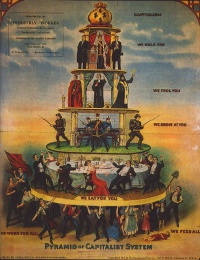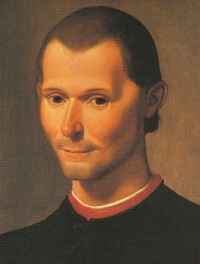Government
From The Art and Popular Culture Encyclopedia

|
"To be GOVERNED is to be watched, inspected, spied upon, directed, law-driven, numbered, regulated, enrolled, indoctrinated, preached at, controlled, checked, estimated, valued, censured, commanded, by creatures who have neither the right nor the wisdom nor the virtue to do so [...]. --Pierre-Joseph Proudhon "The various modes of worship which prevailed in the Roman world were all considered by the people as equally true; by the philosophers as equally false; and by the magistrate as equally useful." --The History of the Decline and Fall of the Roman Empire (1776-89) by Edward Gibbon "Justice being taken away, then, what are kingdoms but great robberies? For what are robberies themselves, but little kingdoms? The band itself is made up of men; it is ruled by the authority of a prince, it is knit together by the pact of the confederacy; the booty is divided by the law agreed on. [...] Indeed, that was an apt and true reply which was given to Alexander the Great by a pirate who had been seized. For when that king had asked the man what he meant by keeping hostile possession of the sea, he answered with bold pride, 'What do you mean by seizing the whole earth; because I do it with a petty ship, I am called a robber, while you who does it with a great fleet are styled emperor'."--The City of God (5th century) by St. Augustine "Today, however, we have to say that a state is that human community that (successfully) claims the monopoly of the legitimate use of physical force within a given territory - the 'territory' belongs to the definition."--Politics as a Vocation (1919) by Max Weber "The cover of Hobbes' Leviathan famously portrays the 'body politic' metaphor by showing a body formed of a multitude of citizens which is surmounted by a King's head."--Sholem Stein "What we may be witnessing is not just the end of the Cold War, or the passing of a particular period of post-war history, but the end of history as such: that is, the end point of mankind's ideological evolution and the universalization of Western liberal democracy as the final form of human government." --The End of History and the Last Man (1992) by Francis Fukuyama |

Illustration:Liberty Leading the People (1831, detail) by Eugène Delacroix.

Image: detail of Sistine Chapel fresco Creation of the Sun and Moon by Michelangelo

|
Related e |
|
Featured: |
A government is the system or group of people governing an organized community, generally a state. It can also describe the leadership of a supranational organization, such as the United Nations or the EU, or a political region, or local units, such as a county, city, or township.
"Government" generally refers to the organizational structure that makes laws, sets policy, and runs the day-to-day affairs of some political unit, region, or community. As such, it generally is not used to refer to organizations that are considered to be privately owned or privately run, such as e.g. a business, a corporation or company, private organization, or any private entity.
In the case of its broad associative definition, government normally consists of legislature, executive, and judiciary. Government is a means by which organizational policies are enforced, as well as a mechanism for determining policy. Each government has a kind of constitution, a statement of its governing principles and philosophy. Typically the philosophy chosen is some balance between the principle of individual freedom and the idea of absolute state authority (tyranny).
While all types of organizations have governance, the term government is often used more specifically, to refer to the approximately 200 independent national governments and subsidiary organizations globally.
Historically prevalent forms of government include monarchy, aristocracy, timocracy, oligarchy, democracy, theocracy and tyranny. The main aspect of any philosophy of government is how political power is obtained, with the two main forms being electoral contest and hereditary succession.
Contents |
Etymology
The word government derives from the Greek verb κυβερνάω (kubernáo) meaning to steer with a gubernaculum (rudder), the metaphorical sense being attested in the literature of classical antiquity, including Plato's Ship of State.
History
Earliest governments
The moment and place that the phenomenon of human government developed is lost in time; however, history does record the formations of early governments. About 5,000 years ago, the first small city-states appeared. By the third to second millenniums BC, Sumer, ancient Egypt, the Indus Valley civilization, had developed into larger governed areas.
One reason that explains the emergence of governments includes agriculture. Since the Neolithic Revolution, agriculture was an efficient method to create food surplus. This enabled people to specialize in non-agricultural activities. Some of them included being able to rule over others as an external authority. Others included social experimentation with diverse governance models. Both these activities formed the basis of governments. These governments gradually became more complex as agriculture supported larger and denser populations, creating new interactions and social pressures that the government needed to control.
Modern governments
Starting at the end of the 17th century, the prevalence of republican forms of government grew. The English Civil War and Glorious Revolution in England, the American Revolution, and the French Revolution contributed to the growth of representative forms of government. The Soviet Union was the first large country to have a Communist government. Since the fall of the Berlin Wall, liberal democracy has become an even more prevalent form of government.
In the nineteenth and twentieth century, there was a significant increase in the size and scale of government at the national level. This included the regulation of corporations and the development of the welfare state.
See also
- Civics
- Deep state
- Hierarchy
- Legal rights
- Monarch
- Political power
- Separation of powers
- Social stratification
- State (polity)
- Tyrany
- Voting system
- World government
- World domination


